|
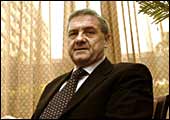 For
KPMG's global chairman, Michael Rake, a trip to India is
becoming an annual ritual. This time around when he paid a week-long
visit, he brought along half-a-dozen other senior executives. Reason?
"There's an enormous demand for audit professionals because
of the Sarbanes-Oxley Act and there aren't too many places where
you can get good audit professionals," says Rake, talking of
India's large pool of English-speaking CAS. Already, KPMG has shipped
about a hundred auditors from India to work in its London office,
and in another four to five years, it plans to increase the headcount
to 2,000. Resources apart, Rake wants more of the audit business
here. But isn't India's audit institute against the Big Four's expansion
in the country? Yes, and Rake did meet ICAI's President during the
trip. His point: "If Indian audit firms want to become world
class, they will have to work alongwith the Big Four." Pressures
from an India Inc. that's going global may already have made that
inevitable. For
KPMG's global chairman, Michael Rake, a trip to India is
becoming an annual ritual. This time around when he paid a week-long
visit, he brought along half-a-dozen other senior executives. Reason?
"There's an enormous demand for audit professionals because
of the Sarbanes-Oxley Act and there aren't too many places where
you can get good audit professionals," says Rake, talking of
India's large pool of English-speaking CAS. Already, KPMG has shipped
about a hundred auditors from India to work in its London office,
and in another four to five years, it plans to increase the headcount
to 2,000. Resources apart, Rake wants more of the audit business
here. But isn't India's audit institute against the Big Four's expansion
in the country? Yes, and Rake did meet ICAI's President during the
trip. His point: "If Indian audit firms want to become world
class, they will have to work alongwith the Big Four." Pressures
from an India Inc. that's going global may already have made that
inevitable.
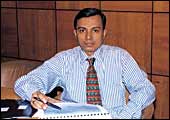 New
Role New
Role
S Naganath's elevation to the corner
room at DSP Merill Lynch Fund Managers has been a quiet affair.
So much so that the 40-year-old, who takes over as President from
the highly-visible Alok Vajpeyi starting January 2005, even refused
to comment on his ascension. Not your typical D-street honcho? Yes.
Considered a whiz-kid by many, the IIM-A alumnus maintains a low
profile, preferring to focus on making sense of the Indian and global
stock markets. But his new job may force him to up his profile.
If he wants to push DSP ML up on the league tables of fund managers,
he'll have to go out and schmooze. Professional hazard?
Welcome To The Club
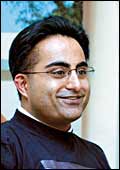 Bet
Harvard didn't prepare Avinash Bajaj for this one. Last fortnight,
sleuths from Delhi Police came calling at baazee.com's offices in
Mumbai. What were they looking for? An online advertisement for
sale of a mobile phone video clip that shows two Delhi Public School
(DPS) students doing what kids shouldn't. As an online marketplace,
baazee.com has 70,000 live listings at any time and the DPS video
clip, the eBay subsidiary says, made its way to the site undetected.
However, a Baazee spokesperson told BT that the offensive advertisement
was taken off within 48 hours of it getting listed. As the online
marketplace culture catches on in India, Bajaj, the dotcom's young
founder-Chairman, should be prepared for worse things. He only has
to look as far as parent eBay, which has had to deal with offers
to sell kidneys, and even virginity, on its site. Bet
Harvard didn't prepare Avinash Bajaj for this one. Last fortnight,
sleuths from Delhi Police came calling at baazee.com's offices in
Mumbai. What were they looking for? An online advertisement for
sale of a mobile phone video clip that shows two Delhi Public School
(DPS) students doing what kids shouldn't. As an online marketplace,
baazee.com has 70,000 live listings at any time and the DPS video
clip, the eBay subsidiary says, made its way to the site undetected.
However, a Baazee spokesperson told BT that the offensive advertisement
was taken off within 48 hours of it getting listed. As the online
marketplace culture catches on in India, Bajaj, the dotcom's young
founder-Chairman, should be prepared for worse things. He only has
to look as far as parent eBay, which has had to deal with offers
to sell kidneys, and even virginity, on its site.
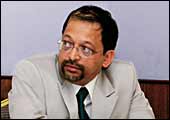 Switching
Medium Switching
Medium
After a near three-decade career at Bennett
Coleman & Co., Pradeep Guha takes over next January as
the Group CEO of Zee Telefilms. Guha, who joined the group, which
publishes The Times of India (TOI) and The Economic Times, as a
21-year-old, and rose to be the President of the TOI Group, is credited
with helping turn around a moribund, also-ran organisation into
a money-spinning, marketing-driven media conglomerate. "I had
done everything that I needed to do with the print media,"
is all Guha would say of his move from print to television. At Zee
the 50-year-old Guha may need to do an encore. Once the most popular
satellite channel, Zee, has lost ground to both Sony and Star over
the years. Of the 100 most popular shows on TV, Zee has only one
versus Star's 53. In terms of advertising revenues, Zee managed
Rs 540 crore versus Star's over-Rs 1,000 crore. Lights, camera,
action...
A Few Good Men
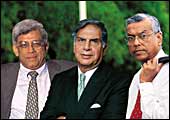 They
are the captains of Indian Industry, and now Finance Minister (FM)
P. Chidambaram has set them up with a difficult task: Bring in $150
billion (Rs 6,60,000 crore) in investment in infrastructure over
the next 10 years. It's a staggeringly tall order, but the fm seems
to believe that the Tata Group's Ratan Tata (centre), HDFC's
Deepak Parekh (far left) and former HLL Chairman Ashok
Ganguly are India's best hope in this effort. Tata, a global
networker, brings brand equity and trust to the team; Parekh, exemplary
skills in finance and sound knowledge of infrastructure; and Ganguly,
an expert in manufacturing technology, a deep understanding of global
businesses. So, does that mean an end to India's infrastructure
woes? Don't bet on it. While the government has set the team an
ambitious target, it hasn't addressed the ground realities. Convincing
global power giants to sell to bankrupt state electricity boards
will be hard even for a team as heavyweight as this one. They
are the captains of Indian Industry, and now Finance Minister (FM)
P. Chidambaram has set them up with a difficult task: Bring in $150
billion (Rs 6,60,000 crore) in investment in infrastructure over
the next 10 years. It's a staggeringly tall order, but the fm seems
to believe that the Tata Group's Ratan Tata (centre), HDFC's
Deepak Parekh (far left) and former HLL Chairman Ashok
Ganguly are India's best hope in this effort. Tata, a global
networker, brings brand equity and trust to the team; Parekh, exemplary
skills in finance and sound knowledge of infrastructure; and Ganguly,
an expert in manufacturing technology, a deep understanding of global
businesses. So, does that mean an end to India's infrastructure
woes? Don't bet on it. While the government has set the team an
ambitious target, it hasn't addressed the ground realities. Convincing
global power giants to sell to bankrupt state electricity boards
will be hard even for a team as heavyweight as this one.
-Contributed by R. Sridharan, Roshni
Jayakar and Shailesh Dobhal
|
